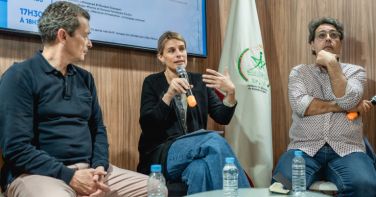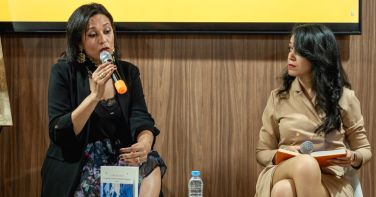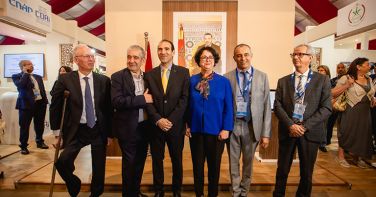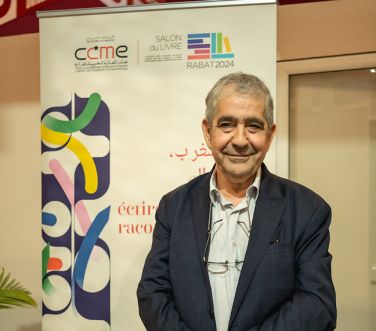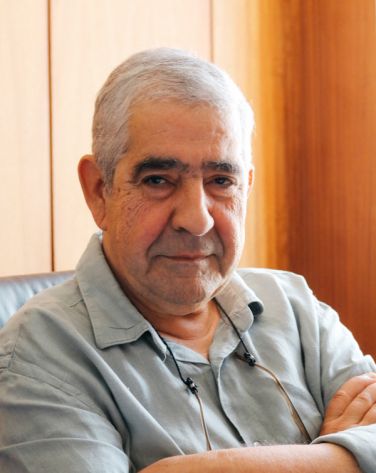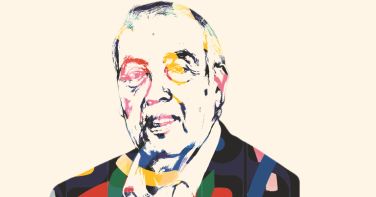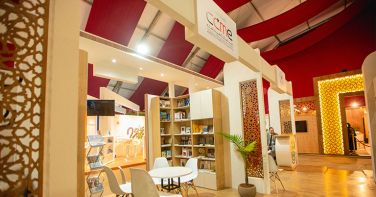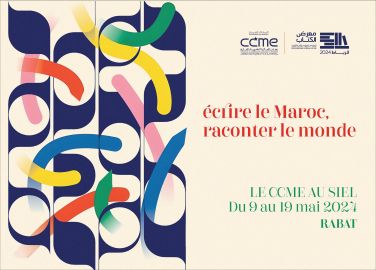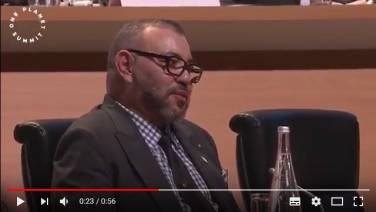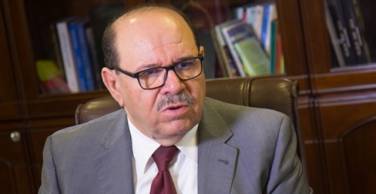A meeting on the theme: "Morocco and Spain. Literature and translation: a universal language" was held on Saturday 11 May 2024 at the Pavillon commun. The event was held to coincide with the 29th session of the Rabat International Book Fair and the activities of the Council of the Moroccan Community Abroad. Moroccan-Spanish author Mohamed El Morabet was the guest speaker at "Une Carte blanche", an open discussion featuring Rocío Rojas Marcos, writer and professor in the Department of Arabic and Islamic Studies at the University of Seville, and Gonzalo Fernández Parrilla, professor of Arabic and Islamic Studies at the Autonomous University of Madrid.
This event examined various aspects of literature and translation between Morocco and Spain, and analysed the literary genres being translated in an attempt to identify ways of bringing together the cultures of both countries.
The participants insisted on the importance of translation in order to inscribe the text in the culture from which it was translated. An act likely to breach barriers across nations, allowing each culture to join the world literature competition. The authors cite the case of Kalila wa Dimna, which, thanks to translation, has now become an integrated part of the Spanish culture, as "local literature is written by authors, while international literature is written by translators", a statement by the writer José Saramago, quoted by
Gonzalo Parilla. Rocío Rojas Marcos stressed that without translations it would not be possible to know the Other, just as modern Europe could not have made itself known without the Arabic translations in the Middle Ages.
Mohamed Choukri in the footsteps of Don Quichotte?
In his address, Mohamed El Morabet compared Don Quichotte's role as a Spanish literary heritage in Moroccan culture with the absence of a literary figure of this magnitude in the Spanish imagination. In analysing this observation, both Spanish academics felt that the Moroccan literary figure closest to the Spanish is the character of Mohamed Choukri, who brought the Spanish public into closer contact with Moroccan culture thanks to the strength of his literature and his narrative. However, Mohamed Choukri's works were translated into French before they were translated into Spanish, which raises another literary issue between Morocco and Spain linked to the language
of translation.
transmitting Moroccan works to the Spanish public can change certain cultural contents, since they pass through a different filter depending on the translator.
Although Gonzalo Fernández Parrilla believes that this is due to the complexity of translating from Arabic into Spanish, Rocío Rojas Marcos believes that this historical observation is above all linked to Spain's position in Europe, which leads it to orient its cultural perspective more towards the countries of its continent than towards Morocco, preferring to translate Moroccan works published in France rather than works from Morocco.
And what about writers of Moroccan origin in Spain?
According to Gonzalo Fernández Parrilla, Spanish writers of Moroccan descent have reflected the concerns of the community: the literature produced in the Spanish language by writers of Moroccan origin that has emerged over the last two decades was initially characterised by its concern with issues of identity, rootedness and integration in the host country. A trend from which Moroccan writers in Spain quickly 'freed themselves', once these subjects had been assimilated and more or less overcome, to give way to different subjects.
What about writers of Moroccan origin in Spain?
According to Gonzalo Fernández Parrilla, Spanish writers of Moroccan origin have reflected the concerns of the community: the literature produced in the Spanish language by writers of Moroccan origin that has emerged over the last two decades was initially characterised by its interest in issues of identity, rootedness and integration in the host country. A trend from which Moroccan writers in Spain quickly 'freed themselves', once these subjects had been assimilated and more or less overcome, to give way to different subjects.
A "natural" development for Rocío Rojas Marcos, who believes that in "any literary work, the author first seeks to explain his position within the new society". Mohamed El Morabet doesn't share this view: "As a Moroccan writer in Spain, I don't know in advance what I'm going to write about or what subject I'm going to write about; I write as part of a constant search for a subject".
CCME
The Council of the Moroccan Community Abroad (CCME) hosted the French-Moroccan writer Leila Bahsaïn on Saturday 11 May 2024 at the joint pavilion of the Book Fair in Rabat. Leila Bahsaïn presented her latest book ‘Ce que je sais de Monsieur Jacques’, published by Albin Michel, to an audience. Ghita Zine interviewed her.
At a press conference on Friday 10 May 2024, the Council of the Moroccan Community Abroad (CCME) was joined by six other constitutional institutions, with which it is sharing a common pavilion for its 15th participation in the International Book and Publishing Fair (SIEL).
Speaking to the media at the event, CCME President Mr. Driss El Yazami explained that the purpose of having seven institutions in one pavilion is to present the work of each institution separately, and inform the public about the missions of each institution, as well as its scientific and cultural achievements and the way it operates.
The Council of the Moroccan Community Abroad (CCME), the Economic, Social and Environmental Council (CESE), the Institution of the Mediator of the Kingdom (IMR), the High Authority for Audiovisual and Communication (HACA), the Competition Council (CC), the National Authority for Ethics, the Prevention of and Combat against Corruption, and the National Commission for the Supervision of Personal Data Protection (CNDP), are sharing a common pavilion at this edition.
The 29th edition of SIEL is being organised by the CCME under the title "Writing Morocco, Narrating the World", a program featuring around 60 guests from ten countries, including Morocco, which reflects the creativity of Moroccans abroad, the emerging generation of young Moroccans and the significant contribution being made by Moroccan women in all spheres of creativity: literature, cinema, theatre, etc. These works are the result of a melting pot of cultures from countries of origin and immigration, enhancing the collective intellectual capital of Morocco and of host countries.
CCME
With more than sixty speakers from Morocco and nine other countries (Germany, Belgium, Spain, the United States, France, Italy, the Netherlands, the United Kingdom and Qatar), approximately twenty partners involved in developing the programme and a shared pavilion with six other institutions active in the promotion of human rights, good governance, human development and participatory democracy, the CCME is proposing a series of events to highlight what it has to offer at the 29th edition of the Salon international de l'édition et de le livre (SIEL). These are some of the themes that the CCME is proposing for the 29th edition of the Salon international de l'édition et du livre (SIEL) under the title: “Ecrire le Maroc, raconter le monde”.
This year's programme has been put together as part of a broad partnership, with four main themes and several special events.
The first event; “A book, a partner”, will feature four books co-published by CCME and the four publishing houses (Langages du sud, la Croisée des chemins, Sochepress and Malika éditions), including one book published in three languages.
The second will feature a “carte blanche” for nine female novelists, writers and researchers, who have chosen the theme on which they would like to discuss with two guests of their choice. Chadia Arab, Hassnae Bouazza, Samira El Ayachi, Soundouss Chraïbi, Kébir Mustapha Ammi, Mohamed El Morabet, Farid El Asri, Hassan Bousetta and Merouane Touali will be taking part in these “cartes blanches”.
A third theme, “Just published”, highlights the most recent literary releases, offering the SIEL visitors an opportunity to discover the latest works by Laïla Bahsaïn, Rim Najmi, Nesrine Slaoui, Khalid Lyamlahy, Zineb Mekouar and Karima Moual.
In addition, three unique previews will be held at the Renaissance cinema. The Moroccan public will have the chance to discover a fiction movie (Sisterhood, by Nora El Hourch), a documentary (Mora est là, by Khalid Zairi) and a musical “Arrivée par avion”, by Nadia Benzakour).
Several other activities are also planned. In partnership with the Cercle des lauréats de Belgique (CLB) and the Délégation générale Wallonie-Bruxelles au Maroc, a homage will be payed to the late Lahcen Zinoun, who recently passed away, and a roundtable is also scheduled in partnership with the Club des journalistes accrédités au Maroc (CJAM) on ‘Being a journalist today’ with Moroccan journalists from abroad and Morocco and MAP's Director General, who will give the opening speech.
Overall, the programme reflects the extraordinary vitality of Moroccan writers and artists around the world, the diversity of their talents and their desire to create, in each their own way, a bond with their roots, while at the same time refusing to accept any definitive labels and assuming their multiple identities. The diversity reflected in this programme is revealed in a wide range of other initiatives.
For the months of May and June only, two events to celebrate Moroccan talent worldwide are being organized with the Council's support: the Diwan Awards in Brussels on 18 May and the “Trophées des Marocains du Monde” in Marrakech on 25 May. On June 1 and 2, in Paris, the Maghreb des livres will be honoring Moroccan literature at the Hôtel de Ville, with our support.
As for partnerships between international skills centres and universities and the private sector in Morocco, several events will be held, including the 13th edition of the meetings on solid-state chemistry, organised by various universities in the Casablanca-Settat region (El Jadida, 15, 16 and 17 May 2024), the 6th summer university organised by the Eman Aerospace international network of Moroccan aeronautics specialists (Agadir and Laâyoune, from 24 June to 6 July 2024) and further afield, in Paris this September, the 16 th "Tremplin Maroc" event organised by Maroc entrepreneurs.
Another event that should be mentioned in the context of SIEL will be the re-publication of seven books by the late Mohammed Khaïr-Eddine (1941-1995) in a boxed set co-edited in partnership with the Académie du Royaume du Maroc and Editions le Fennec. Two other box sets are scheduled to be released in the next few months, featuring the novels of Kebir Mustapha Ammi and Rachid Benzine.
At a time where many societies are plagued by movements of exclusion of the ‘other’ or of those who are perceived as such, even if they were born and raised in the country, the present programme reflects the tremendous level of creativity that exists in all communities of ‘foreign descent’, in our case the worldwide Moroccan community and its descendants. In every field and in every language in the world, the creators invited here show tremendous talent, contributing to both Moroccan culture and the culture of the country of residence and/or birth, with a major trend in the background: the growing “feminization” of this talent, as shown by the list of our guests, which is almost made up of equal numbers of men and women. Another piece of good news.
Driss El Yazami
Seven partners, one joint pavillion
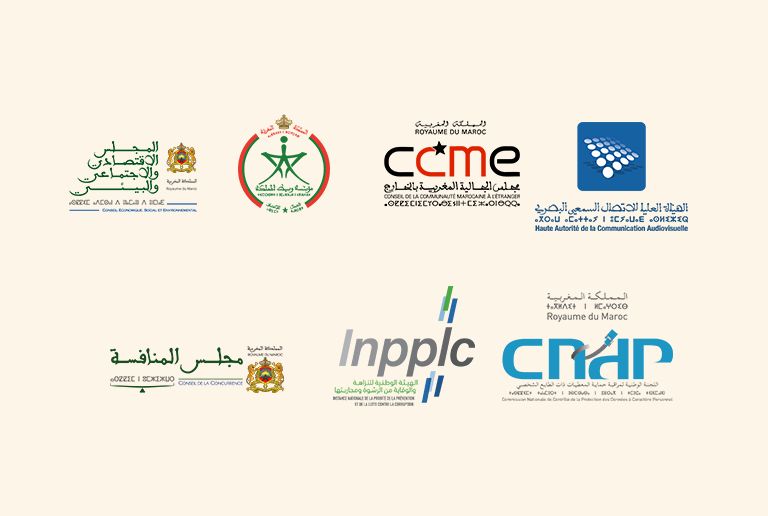
The CCME program at the SIEL was developed in partnership with
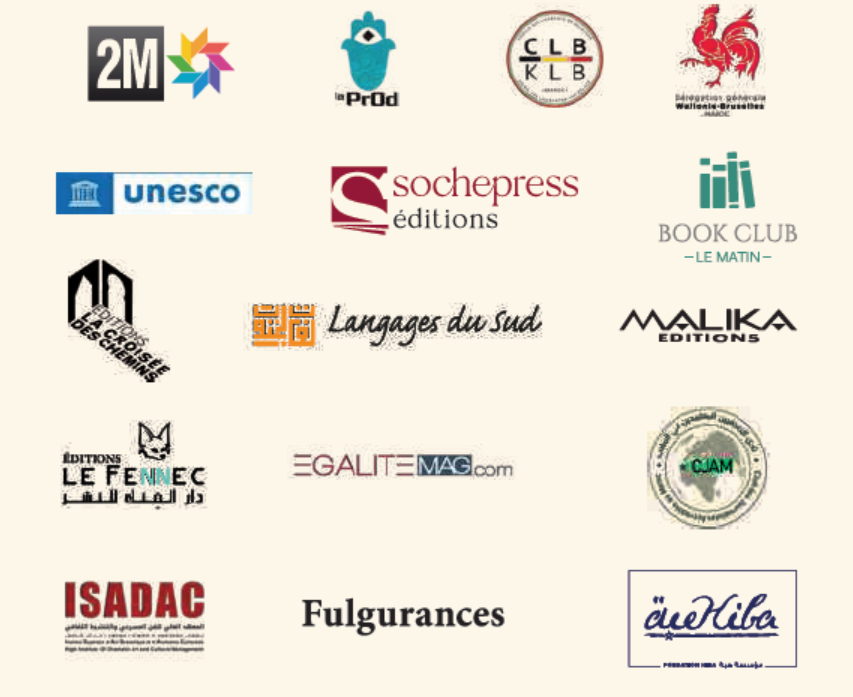
With more than sixty speakers from Morocco and nine other countries (Germany, Belgium, Spain, the United States, France, Italy, the Netherlands, the United Kingdom and Qatar), approximately twenty partners involved in developing the programme and a shared pavilion with six other institutions active in the promotion of human rights, good governance, human development and participatory democracy, the CCME is proposing a series of events to highlight what it has to offer at the 29th edition of the Salon international de l'édition et de le livre (SIEL). These are some of the themes that the CCME is proposing for the 29th edition of the Salon international de l'édition et du livre (SIEL) under the title: “Ecrire le Maroc, raconter le monde”.
Here we are at our first book fair without you, dear friend. Just as we missed you a few weeks ago in Oujda, at the fourth edition of the Maghreb Book Fair, which you never missed. We will therefore no longer see you wandering the alleys of the fair, saluting your friends, colleagues and authors, and always standing on your book stand, except on a few occasions last year when illness began to take its grip on you. Always on your feet, except for a few times last year, when your fatigue began to claim you. Standing on the Croisée des chemins stand, handing out books and offering comments on your latest publications. You were enthusiastic and tireless. Curious and inventive, always open to new publishing adventures.
The 29th edition of the International Book and Publishing Fair (SIEL) was officially opened on Thursday 9 May 2024 at the Espace OLM Souissi in Rabat by the Head of Government, Mr Aziz Akhannouch, and Mr Mehdi Bensaid, Minister for Youth, Culture and Communication.
Writing Morocco Narrating the world
Thursday 9th May 2024
Inauguration
Friday 10th May 2024
Opening ceremony of the joint pavilion.
The attendees: Mr. Ahmed Réda Chami, President of the Economic, Social and Environmental Council (CESE), Mr. Mohamed Benalilou, Mediator of the Kingdom (IMR), Mr. Driss El Yazami, President of the Council of the Moroccan Community Abroad (CCME), Mrs Latifa Akharbach, President of the High Authority for Audiovisual Communication (HACA), Mr. Ahmed Rahhou, President of the Competition Council (CC), Mr. Mohamed Bachir Rachdi, Instructor at the Ministry of Foreign Affairs (MFA), and Mr. Omar Seghrouchni, President of the National Commission for the Supervision of Personal Data Protection (CNDP).
Saturday 11th may 2024
- “Carte Blanche” with Mr. Mohamed El Morabet (Spain)
Guests: Rocío Rojas-Marcos and Gonzalo Fernández Parrilla
Theme: Morocco and Spain. Literature and translation: a universal language
Joint Pavilion conference room from 4pm to 5pm.
Speech by Mohamed El Morabet
“We will be exploring the dimensions of literature and translation between the two countries in order to remove the bridge of communication that exists in this field.
What do Moroccans read? What do Spaniards read?
What type of Spanish literature is translated in Morocco? What type of Moroccan literature is translated in Spain? What mechanisms could be envisaged to promote more translations between the two countries? In 2020, Spain was the guest of honour at SIEL. Could Morocco be the guest of honour at the Madrid Book Fair in 2030?”
- New release
Introducing the novel « Ce que je sais de Monsieur » by Leïla Bahsaïn (Albin Michel, 2024).
Moderator: Ghita Zine
Joint Pavilion conference room from 5.30 pm to 6.30 pm.
Sunday 12 may 2024
Un livre, un partenaire
Introducing the novel : « Echos de la mémoire sur les montagnes du Rif» by Fatiha Saïdi (CCME-La Croisée des Chemins, 2024)
The event will take place at the joint pavillon
Monday 13 May 2024
New release
Introduction of the novel “L'amant secret de Mme Merkel (in Arabic) by Rim Najmi (Dar Al-Masriah Al-Lubnaniah, 2024)
Moderator: Mohamed Massad
Joint Pavilion conference room from 3 p.m. to 4 p.m.
- Preview of the movie “Sisterhood” by Nora El Hourch,
In partnership with La Prod and egalitemag.com. In the presence of the director.
Cinéma Renaissance at 7pm.
Synopsis
Despite the social gaps, Amina, Djeneba and Zineb have been friends for most of their live. When Zineb is harassed by her brother's best friend, Amina posts a compromising video of him on social networks, hoping that he will stop. But she does not take into account the terrible consequences of her act: the video will not only endanger her safety, but also put their friendship in jeopardy.
Tuesday 14 May 2024
- Preview of the documentary “Mora est là” by Khalid Zairi in partnership with 2M.
Cinema Renaissance at 7pm.
Synopsis
“With immigration issues subject of controversy and heated debates in Europe, a reminder of former policies allowing Moroccan minors to immigrate to France on a selective basis”
Mora gives us an insight into the traumatic stories of former Moroccan miners recruited by Felix Mora to work in the mines of Nord-Pas-de-Calais.
Felix Mora was the implacable instrument of a policy that proletarianised thousands of young peasants, uprooted from their environment and embarked on a vast project that would later have major social, cultural and political consequences in terms of the integration of the new generations born of this immigration.
Wednesday 15 May 2024
- New release
Presentation of the book “Il Freddo in africa e altre storie di un'italia nata altrove” (in Italian) by Karima Moual (Ed. Luiss - University Press, 2024)
With : Karima Moual (Italy); Halima Hadir (Italy); Yasine El Aouak (Italy).
Moderated by: Abdellah Redouane
Joint Pavilion conference room from 11 a.m. to noon.
The book: “Il Freddo in africa e altre storie di un'italia nata altrove” (Ed. Luiss - University Press, April 2024) reviews the phenomenon of migration in Italy and its challenges through eleven stories of successful migrants with their own business ideas: among them three entrepreneurs of Moroccan origin. The book also includes an important interview with Nobel Prize winner Muhammad Yunus, a foreword by Italian-Moroccan international star Malika Ayane and an updated report by the Leone Moressa Foundation on the phenomenon of entrepreneurship in Italy.
New release
Introducing the novel “Seule” by Nesrine Slaoui (Fayard, 2023)
Moderated by: Aicha Sakhri
Joint Pavilion conference room from 3pm to 4pm.
Thursday 16 may 2024
- Tribute to Lahcen Zinoun.
In partnership with the Belgian Cercle des Lauréats and the Wallonie-Bruxelles Delegation in Morocco.
Café de la scène, Renaissance cinema at 6pm.
Lahcen Zinoun, dancer, choreographer, writer, director and film-maker.
Lahcen Zinoun was the first moroccan-born dancer in Europe, and the first to be named danseur étoile in Belgium, before returning to his native country to pursue a long and rich artistic career.
- Preview of Nadia Benzakour's play “Débarquée de l'avion”.
In partnership with the Institut Supérieur d'Art Dramatique et d'Animation Culturelle (ISADAC).
Cinéma Renaissance at 7.30pm.
Synopsis
Nawal has to attend a cocktail party in Marrakech. Her mission is to deliver a present to Mr Ballou, a secret gift box given to her by her father.
But "Tonton Ballou" is a very busy man and Nawal encounters guests who ask her the same old questions about where she comes from. Was it New York? Or Paris? Ah, France... not the same thing.
She eventually opens up to the audience about her unconventional life as a Moroccan in a privileged neighbourhood in France, and realizes that she has always hidden away her differences.
Ultimately, she learns to be herself: a dreamer.
- A book, a partnership
Le dernier Rekkas, by Aomar Boum ('Southern languages' - CCME, 2024)
Moderator: Ahmed Skounti
The Kitab space, Ministry of Youth, Culture and Communication at 6.30pm.
Summary
In this book -published in Arabic, French and English- Aomar Boum, a Moroccan anthropologist living in the United States and member of the Académie du Royaume, recounts the life of his father, who was most likely one of the last Rekkas in Morocco - the messengers who carried letters on foot- prior to the “birth” of the post office. The book is illustrated by Majdouline Boum-Mendoza, the author's fourteen-year-old daughter born in the US.
In this book, Aomar Boum and his daughter cement the links between three generations and weave together their family's history and the broader history of Morocco, bringing to light little-known aspects of our past.
-One book, one partner
Introducing the the book “Villes et villages du Maroc (etymologie, histoire et légendes) » by Mouna Hachim (Sochepress-CCME, 2024)
In partnership with Sochepress, organized as part of a Book Club with Groupe Matin du Sahara
Moderator: Abderrahim Kassou
Saturday 18th may 2024
- Carte blanche to Kebir Mustapha Ammi (France)
Guests: Fouad Bellamine and Driss Khrouz
Theme: What if we made the arts and literature the foundation of our horizon?
Venue: conference room of the Pavillon Commun at 10.45am to 11.45am.
Remarks by Kebir Mustapha Ammi
Redefining culture in its diverse forms and addressing crucial issues for the future.
- New release
“Adieu Tanger” by Salma El Moumni (Grasset, 2023)
Moderator: Nadia Paquereau
Joint Pavilion conference room at 1 p.m. to 2 p.m.
- Carte Blanche with Chadia Arab (France)
Guests: Carolina Kobelinsky and Radouane Frikach
Theme Bodies and Death in Migration: Movements, Practices and Differences.
Joint Pavilion conference room at 2.30 pm to 3.30 pm.
Comments by Chadia Arab
The meeting will be a “cross-examination” between CNRS researcher Carolina Kobelinsky, an anthropologist specializing in politics and migration -in particular of the immigrants dying on Europe’s borders- and Radouane Frikach, head of a funeral parlour and a member of the Muslim cultural association in Trélazé, near the french city of Angers.
- Carte blanche to Kebir Mustapha Ammi (France)
Guests: Fouad Bellamine and Driss Khrouz
Theme: “What if we made the arts and literature the foundation of our horizon?”
Venue: conference room of the Pavillon Commun at 10.45am to 11.45am.
Remarks by Kebir Mustapha Ammi
-New release
“Adieu Tanger” by Salma El Moumni (Grasset, 2023)
Moderator: Nadia Paquereau
Joint Pavilion conference room at 1 p.m. to 2 p.m.
- Carte Blanche with Chadia Arab (France)
Guests: Carolina Kobelinsky and Radouane Frikach
Theme Bodies and Death in Migration: Movements, Practices and Differences.
Joint Pavilion conference room at 2.30 pm to 3.30 pm.
Sunday, May 19, 2024
- One book, one partner
Presentation of Tanger by Mohamed Métalsi (Malika éditions-CCME, 2024)
Speakers: Anouar Majid and Mustapha Akalay Nasser
Room Ofoq, SIEL conferences pavilion, at 12:15 p.m.
The right to access information is guaranteed by law.
Law 31.13 on the right of access to information came into force on March 12, 2019 in Morocco.
- Law 31.13 on the right of access to information. Download
- Guide to Law 31.13, developed by the Department of Administration Reform - Ministry of Economy, Finance and Administration Reform. Download
In accordance with this law, the CCME has designated officials in charge of receiving and processing access to information requests and has set up an internal cell to support them.
- Decision appointing CCME officials responsible for processing and receiving access to information requests. Download
How to submit your access to information request?
Before making a request
Before submitting an Access to Information request, you can search the CCME website to see if the information already exists.
Submit a request by e-mail, mail or fax
Please fill out the form, and send it by email, mail or fax.
- Email: This email address is being protected from spambots. You need JavaScript enabled to view it.
- Mail: Mahaj Ryad 10 - Imm.M - BP 21 481. Hay Riad - 10000 Rabat - Morocco
- Fax: 00 (212) 5 37 56 66 22
This edition of the International Book and Publishing Fair (SIEL) is being held in a unique and unprecedented context. It will be the first event of international scope hosted by our country after a two-year suspension due to the repercussions of the Covid-19 pandemic, with a large influx of Moroccan and foreign visitors. This is a fine way to celebrate the Kingdom's inspiring success, under the wise leadership of His Majesty King Mohammed VI, in overcoming the most perilous undertakings to breathe new life into Moroccan cultural and intellectual life, this time from Rabat, the city of light, the capital of culture in the Islamic world and the cultural capital of Africa, which qualifies it, exceptionally, to host the continent's biggest cultural event this year.
The Council of the Moroccan Community Abroad (CCME) has chosen to focus its participation in the current edition of the SIEL on the theme "Africa in the eyes of its communities", with the aim of placing the issue of African migration at the centre of the societal debate and the cultural and intellectual current affairs of this global event, which this year has chosen Africa as its guest of honour.
Africa is one of the priority themes for the CCME, which had decided, due to the anchoring of the African tributary in the Moroccan identity, to dedicate its participation in the 2014 SIEL to Africa, being a continent at the source of human mobility. In addition to the achievements of the different works undertaken in this sense, the council intends to deepen the debate on the contemporary challenges of African migration, particularly in Europe, in the context of the profound political and cultural changes that are taking place in its societies, where the migration issue, in this case African, is becoming a major issue, the pivot of political conflicts and electoral programmes.
The debates on immigration in Europe in recent years reflect the dominance of nationalism due to the rise of extreme right-wing waves and the revival of conservative ideological theories that reject pluralism and advocate introversion as a way of life, making people believe that immigrants are a threat to the existence and culture of European societies based on misleading arguments and erroneous data that have been disproved by all the official statistics of international institutions.
Migration is an ancient phenomenon, but its treatment is currently being unjustifiably amplified. If we stick to the real facts, migrants constitute only 3.5% of the world's population, so 96% of them live in the countries where they were born. Moreover, African migrants represent only 14% of the world's migrants, a much smaller proportion than European (24%) and Asian (41%) migration, bearing in mind that more than 60% of migration in the continent is intra-African. Thus, adopting an objective and scientific approach to the treatment of African migration, whether in elections or in media debates, is one of the greatest challenges to be overcome.
On the other hand, an accurate understanding of the migration phenomenon requires a deeper understanding of several related changes. The structure of migration has undergone a radical transformation in terms of composition, since it is no longer undertaken solely by a labour force of workers with a view to returning to their countries of origin, but has become a rooted migration that has produced intellectual and scientific elites who have risen to high ranks in their fields of competence. This intelligentsia then expresses expectations that go beyond the thresholds of the first generations, their social interaction is no longer limited to migrant or worker services in the host countries but extends to state institutions as they enjoy full citizenship and hold two or more nationalities. More than that, these elites have become capable of developing visions and theories that question the intellectual and philosophical structures of the state and society.
Thus, addressing the issue of African immigration cannot be done in isolation from the issue of our time, that of the international race to attract highly qualified talent in such advanced fields as health, engineering, agriculture and modern technology. This is one of the modern and complex issues that are widening the gap between developed and developing countries, which are threatened with losing their skills due to the temptations and opportunities.
Therefore, addressing the issue of African immigration cannot be done in isolation from the issue of our time, that of the international race to attract highly skilled talent in cutting-edge fields such as health, engineering, agriculture and modern technologies. This is one of the modern and complex issues that are widening the gap between developed and developing countries, which are threatened with losing their skills due to the temptations and opportunities for professional and financial advancement offered by the countries of the North.
Finally, the Covid-19 pandemic has also had a profound impact on the world of migration. For the first time in contemporary history, the movement of people is confronted with closure measures in all continents, as almost every country in the world has imposed a general quarantine. Immigrants in Europe have lived through a most difficult period as they represent one of the vulnerable fragile groups, but these extremely difficult conditions have above all been an opportunity for them to assert their added value and to affirm that all the components of a plural society contribute, each thanks to their uniqueness, to the destiny of humanity. Immigrant communities working in vital sectors have found themselves in the forefront of providing basic services to the community of residence, and supporting materially and morally their family members in the countries of origin, through financial transfers and intercontinental civil initiatives.
These transformations and contractions experienced by the immigrant community, including the Moroccan community and all African communities, must be apprehended according to a global, scientific and objective approach in order to understand the contemporary migratory reality from all its angles and to anticipate responses to the issues and challenges of the future. Above all, it will be necessary to measure the cultural and intellectual wealth that African migration has produced and to value the contribution of African migrants to development, whether in the host countries or in the countries of origin. The ultimate goal is to develop a unified vision involving all civil actors of African migration in order to succeed in the process of integration and coexistence and to change the reductionist mentalities of certain groups in Western societies.
To this end, the stand of the Council of the Moroccan Community Abroad offers a rich and diverse intellectual and cultural programme on various aspects of African migration at the Rabat International Book and Publishing Fair, while presenting an important set of recent publications of the Council on several migration-related topics. The program is not limited to the stand area but extends to cultural and intellectual activities in other areas, in partnership with academic institutions and civic organisations, to make our participation in this year's edition a unique contribution to the influence of Rabat, capital of lights.
Abdellah BOUSSOUF
Secretary General of CCME
The CCME’s presence and participation at the Casablanca International book & Edition Exhibition (SIEL) has become a must.
During prior editions of this cultural event, the Council’s participation was underlined by an in-depth thought process about the reality of Moroccan immigration in Western society. We have attempted to break down the essence of the actual challenge arising from living together in a diverse society as well as the opportunities that arise from it. We also opened the debate around the complexity of identity related tensions within host countries and included multiple key stakeholders, including institutions, into the discussions. The output consisted of both answers and actual proposals. The study of Moroccan immigration’s characteristics has allowed to conclude that a successful integration within the various host countries is primarily enabled by a plural Moroccan identity that allows co-existing alongside any culture. A study of those who carry these values becomes a vehicle to openness and cultural enrichment for the host country which in turn shares its culture and expertise. This exchange process consolidates the consecration of universal values and actively contributes to the development of both host and native countries. For the CCME, this 25th edition of the SIEL, dedicated to the presence of Moroccan culture beyond borders, rediscovers its components and richness, will be an opportunity to deepen the knowledge of its assets and the challenges it faces. To achieve that we will attempt to provide Moroccans across the globe with tools likely to contribute to the development of the host societies and at the same time allow the Moroccan culture to leverage globalisation for the benefit of future generations. Moroccan designers and artists worldwide have the ability to uphold the Moroccan culture on the international scenery through their creations.The CCME’s agenda merely reflects the richness and diversity of Moroccan creations around the globe. We are pleased to welcome visitors of the SIEL to the CCME booth to exchange, interact and share our immigration related experiences.
Abdellah Boussouf
The Council of the Moroccan Community Living Abroad (CCME) participates this year in the 24th edition of the International Exhibition of Books and Publishing (SIEL) of Casablanca which is held from 8 to 18 February 2018. The CCME, as at of its previous participations, brings together Moroccan writers living abroad, questions the concerns of Moroccan migration and the challenges facing the Moroccan community abroad through round tables and conferences aimed to give adequate answers.
With the political and social changes experienced by the countries hosting the Moroccan community in the last three years, particularly with the rise of extreme right-wing currents, the activism of extremist religious groups and the rise of racist speeches and acts in general and against Islam in particular, issues of identity, religion and culture are fundamental for the members of the Moroccan community living abroad. More than ever, they require a deep and serious thinking to develop a model able to protect the Moroccans living abroad from the consequences of these changes and help their integration into plural societies.
Through our participation this year at the Casablanca Book Fair, which has become an essential cultural event on an international extent, we have the ambition to debate and analyze the criteria of living together in a plural society with the presence of thinkers, intellectuals academics, political, cultural and associative actors from the host countries of the Moroccan diaspora; to highlight the values of pluralism and openness rooted in the Moroccan identity and the wealth of its branch. In fact, values that can lead to adequate answers to the daily lives of Moroccans around the world in the host countries.
We will also have the opportunity to expose aspects of the history of travel and migration of the Moroccan identity in front of a young audience through a special program that combines educational and cultural activities.
Like it’s previous participations to this cultural event, the Council will share it’s scientific experience on Moroccan migration with national institutions and the public. The CCME’s stand will expose the latest scientific publications on different issues of Moroccan migration. As well as the latest literary works of the writers and poets of the diaspora.
Culture, Islam, publications of works on migration in Europe in all its aspects, meetings with youths in host countries and in Morocco, conferences in Europe but also in Morocco involving academics and Moroccan universities on Moroccan migratory questions, but also the African ones, followed by proposals and books. This has been the year 2017 for the Council of the Moroccan Community Living Abroad (CCME).
The culture and religion of our fellow citizens living abroad has become a key issue since more than a decade in their host countries. Particularly, considering the birth of the gruesome beast of terrorism which trivializes racist and xenophobic speeches designing Muslims as the scapegoats in the western world. With the rise of nationalisms in a part of European countries emphasized since the so-called crisis of refugees mainly from Muslim countries devastated by civil wars, settled immigrants in Europe for decades have suffered the consequences of policies of religious, identity and cultural exclusion.
Terrorist attacks in Europe by individuals claiming perpetrating their appalling acts in the name of their vision of islam during the last decade, have all of a sudden been labeled "Muslim immigrants" by the most extreme movements in Europe. But also the all-news channels and virtual media, which by their lack of hindsight and enslaved by a a disastrous policy of urgency » commit errors from which there is no coming back.
There are moments in History where hesitancy is not allowed. And HM the King's speech at the 2016 Throne Day was historic and courageous in a world where words seem to have lost their sense. In his address to the Nation HM the King deconstructed the speeches and the foolishness of these criminal gangs claiming themselves muslims. The King called the Moroccans living abroad not to forget the essence of their identity and their religion which is an Islam of peace and openness..
The CCME has since, this Royal speech, which will last in History, made of the issues identity-religion-culture one of its main axes of engagement through including fundamental meetings in Morocco and Europe and partnerships for the indispensable training of Ulema in Europe. A vital didactic work for our fellow citizens abroad living mainly in Europe.
« Islam, identity, culture » this is the triptych to which the CCME « devoted itself » in 2017. Especially in Spain, France, Belgium and Germany, where one of the most important meetings of nearly 150 Ulema has been held. Active in European countries but as well in Morocco particularly through cultural events that tell the story of Migrant Travelers; Leila Alaoui, a young photographer who traveled the world seizing moments of humanity killed in a terrorist attack in Ouagadougou; the pioneers settled in Europe since the post-war period; students from all over the world, for their part, were able to travel to Morocco to better understand their European comrads of Moroccan origin; groups from Europe and Africa also came to the Council to share their experiences on the migration issue.
CCME
By Mr. Abdellah Boussouf, Secretary General of the Council of the Moroccan Community Living Abroad (CCME)
Beyond figures and legal articles, the Moroccans living abroad are an immense part of the essential capital of Morocco in every part of the world.
Moroccans of the third and fourth generation have given in several European countries rise to a highly qualified and supervised elite. An elite which commands the languages of the host countries, is anchored in the traditions and civilizations of these countries and has been able to occupy fields of influence in politics, economics and finance, society and in scientific and academic training.
Every step made and success achieved by the Moroccans of the world in their host country is positive for Morocco’s image in the world. It is our duty to imagine the added value of all these achievements realized every day by the Moroccans living abroad.
Scientists in research centers ; professors in the most prestigious universities in the world ; physicians with diverse professions ; eminent lawyers, writer ; filmmakers, musicians, artists, sportsmen ; Journalists, Facebook influencers…
It is on this elite of Moroccans living abroad, that Morocco needs to strengthen its image in the world. This is the reason for which sociology researchers claim that Moroccans living away from their homeland, are the blueprint of their country abroad ; in the capacity to represent the history, geography and an exceptional country named Morocco.
The stars of the Kingdom shine in the heavens of tourism and investment ; the names of young Moroccans working in the centers and agencies of aeronautics and space in the United States, Japan and France : such as Kamal Oudrhiri at the NASA, Rachid Amrousse at the Japan Aerospace Exploration Agency Jaxa, Ahmed Bachar at the National Center for Scientific Research (CNRS) in France, Nacer Ben Abdeljalil who carried the Moroccan flag at the top of the " Everest in the mountains of the Himalayas, or Merieme Chadid, astronomer and first woman from the arab world to set foot on the Antarctic during a scientific mission and exploration, Asmae Boujibar, the first Arab woman to integrate NASA ... And of course, the leader of the Moroccan scientists of the world, researcher Rachid Yazami, founder of the graphite anode for lithium-ion batteries.
As well of course, Khalid Rahilou, Badr Hari, Mustapha Lakhsem and many other martial arts champions, have all printed their names on an international level. Their victories were followed by the moroccan national anthem. As for Abdeslam Radi, race champion, and, Larbi Ben Barek, the outstanding footballer nicknamed « the black pearl ».
Moroccan names in various sports that gave victory to European, American and Asian teams, like Abdellatif Benazzi, captain of the national Rugby team of France.
Gad El Maleh, Jamel Debbouze, Said Taghmaoui and Red One are shining stars in the heavens of the seventh art, music and humor.
Rachida Dati, Najat Vallaud Belkacem, Myriam El Khomri, Ahmed Boutaleb, Samira El Aouni, Fatima Houda-Pépin, Mounir El Mahjoubi and all these deputies, advisers to ministers, mayors of European cities, international institutions, think tanks and survey institutes…
All these skills, these Moroccan numerous brains in the world are the vivid image of Morocco abroad. We must also pay tribute to two children of Moroccan origin : two brilliant skills victims of terrorism and hatred. The architect Mohamed Amine Benmbarek, who died in the Paris bombings in 2015 and the artist-photographer Leila Alaoui, killed in Ouagadougou in 2016.
An huge and major wealth that Morocco has, through media figures and distinguished writers who contribute to the development and evolution of the world and spread the values of living together. They are emblematic figures who speak for Morocco abroad and its image in the world.
In the case of defending "complicated national issues" such as the national sovereignty within the framework of "parallel diplomacy", they are able to claim territorial unity and a new vision of Morocco's associative network, since many of them are activists in non-governmental organizations and bodies.
This makes of the Moroccan diaspora "the strong and winning link" to the modus operandi of promoting the image of the Kingdom abroad.
Flooding in Spain
Flooding in Spain: Ministry of Foreign Affairs, African Cooperation and Moroccan Expatriates Mobilized to Provide...

The Ministry of Foreign Affairs, African Cooperation and Moroccan Expatriates, through its central crisis unit, and the Moroccan consular services in the Spanish regions affected by the floods, are mobilized...

